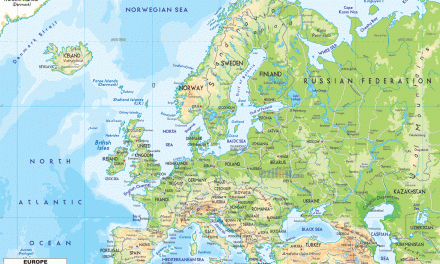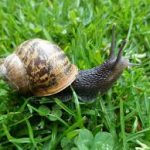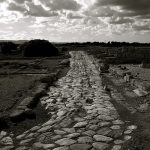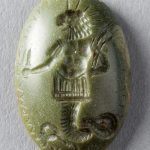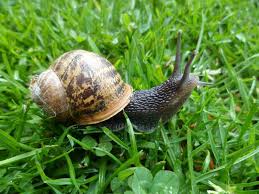
As my husband’s birthday is looming, I have been wondering about his special meal. He asked for steak, but left me entire freedom for starters. Naturally, I thought of snails. Yes, this is a French house, and he adores snails. But snails are part of many people’s diet around the world (snail soup in Morocco, fried snails in Indonesia, for instance), as they were part of ancient Greeks’ everyday food (so I learned today, reading good old Galen). For all my vegetarian and vegan friends around, I should specify that I personally stopped eating snails long ago. When Hubby came up with the proposal of eating snails from the garden, I screamed in horror and threatened to leave the house forever. As if it wasn’t bad enough to think of the terrible fate of the ‘gros escargots de Bourgogne’ filling the jars kindly gifted by my parents!
Any rate. As I flipped through the pages of Galen’s treatise On the properties of foodstuffs this morning, I came across a chapter on snails (Alim. fac. III, 2). Galen comments on the properties of a wide range of foodstuffs, from cereals and pulses (book I) to fruit and veg (book II) and meat and other animal products (book III). Snails belong to the latter category, although Galen is at a loss to put them in a class of animals – they are terrestrial animals, but have no feet… In passing, Galen notes that he ought to mention snails, which belong to the average Greek’s diet, while he won’t mention worms and snakes, although those, too, get eaten by humans. But, Galen says, those who eat snakes and worms belong to far remote nations, and they won’t read his book (!). On the contrary, snails are commonly eaten by Greeks, and therefore have their place in the book. Galen shows awareness of diverse customs around the world here, but also explicitly draws the line at what his readers are likely to eat, assuming they don’t want to hear about weird customs from beyond the Greek-Roman sphere. I don’t know whether the idea that ancient Greeks, too, ate snails made me feel better about cooking them. But Galen states that, for those who are able to digest them easily (an interesting caveat), they are very nourishing. This seems to be confirmed by modern nutritionists, although it should be pointed out that snails should be thoroughly cooked, or you risk serious poisoning. This is probably why Galen recommends boiling them three times over, changing the water in between. Sadly, the complementary treatise he wrote, about cooking, is lost. But, he says, some prepare it with oil, garum, or wine. Now, although modern nutrition specialists praise the high ratio of protein to fat in snails, I should state that eating them without garlic butter is senseless.
This was a special post for my fellow French readers, if there are any, on this special day.
Further reading:
Galien. Oeuvres, Tome V. Sur les facultés des aliments (texte établi et traduit par John Wilkins), Paris, 2013




